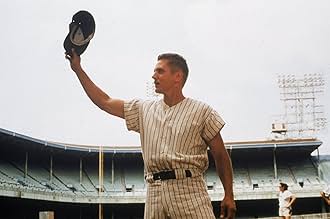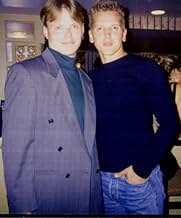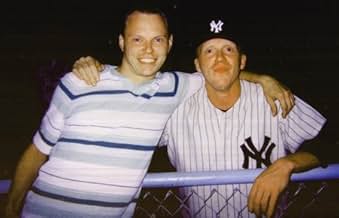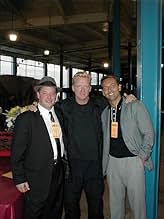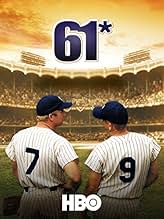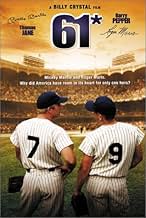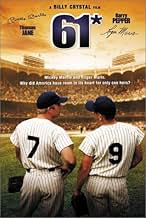Roger Maris and Mickey Mantle race to break Babe Ruth's single-season home run record.Roger Maris and Mickey Mantle race to break Babe Ruth's single-season home run record.Roger Maris and Mickey Mantle race to break Babe Ruth's single-season home run record.
- Won 2 Primetime Emmys
- 4 wins & 26 nominations total
- Director
- Writer
- All cast & crew
- Production, box office & more at IMDbPro
Featured reviews
Being 33 years old as of this writing, I knew little about the Roger Maris-Mickey Mantle home run chase of 1961 until the Mark McGwire-Sammy Sosa home run chase of 1998. I didn't learn a whole lot about the '61 chase in '98 but I learned enough to develop a solid interest in it.
Still, I didn't have very high hopes for "61*." Most of the made for TV movies that I've seen haven't made a strong impression on me, including those made for cable TV, as this was (for HBO). Furthermore, I've never been a big Billy Crystal fan. Though I love comedy, I've never found him to be that funny. And I didn't have a lot of confidence in him to make a good drama, either.
And on top of all that, I often find sports biography movies to be disappointing, often leaving out important details while at the same time over-Hollywoodizing. "Rudy," for example. But when I saw the DVD of "61*" at a Family Dollar store, priced at just $6, I took a chance and bought it. And I'm glad I did!
Crystal won tremendous respect from me with this movie. Almost flawlessly, he tells one of the most interesting single season sports stories that I know of. And I know of more than probably 99% of the American population!
From the start, the 1961 Major League Baseball season was ripe to be a classic. Babe Ruth's single season home run record of 60, set in 1927, was more vulnerable than ever because of two major changes. The Los Angeles (later California and now Anaheim) Angels and Washington Senators (now Texas Rangers) began play, thus spreading the pitching talent more thinly. And the regular season increased in length from 154 games - which had also been the season length in 1927 - to 162, as it remains today.
The biggest reason why I find the '61 chase more interesting than the '98 chase is that in '61, the top two contenders were teammates. Both played for - who else - the New York Yankees. One was Mickey Mantle (played by Thomas Jane), who had already spent a decade with the Yankees and was unquestionably the biggest star of the day. The other was Roger Maris (Barry Pepper), who was much less heralded. Maris had just emerged as a star the year before, winning the American League Most Valuable Player award in his Yankees debut, which followed three solid but unspectacular years with other Major League teams.
Both Mantle and Maris hailed from rural states - Oklahoma and North Dakota, respectively - but were very different people. Mantle epitomized the word "superstar." Besides excelling at every area of the game, he was a charismatic, care free party animal and a fan favorite, the natural heir to Babe Ruth, Lou Gehrig, Joe DiMaggio and other legends. In sharp contrast, Maris was an introvert who largely shunned the spotlight. He loved the game but never attempted to be what the media and fans wanted him to be.
(On a side note, I'm a Maris sympathizer because I can relate to being rejected by people who I don't bother simply because I don't follow the crowd and I believe in judging people based on substance more than anything else. Yankees fans should have loved Maris and embraced his phenomenal achievement that year.)
As the season progressed and both Mantle and Maris stayed near the pace to break Ruth's record, it was obvious that the fans favored Mantle by far. And when Mantle was slowed by injuries, the fans generally ranged from lukewarm to hostile in their treatment of Maris as he neared the record. For example, the Yankees' last game of the regular season, which they hosted, drew a crowd of just 22,000 even though Maris entered the game tied with Ruth and even though the Yankees went on to win the World Series that year.
This is a sharp contrast to 1998, when McGwire regularly filled stadiums in pursuit of Maris' record even though McGwire's team didn't even make the playoffs that season. And in sharp contrast to McGwire's enthusiasm for breaking the record, Maris did not seem to get a lot of joy out of it. He had a difficult time dealing with negativity from the media and fans and also missed the birth of a son during the season.
There are so many things to love about "61*" that it's hard to list them all. The movie does a great job recreating 1961 in every way. Crystal even managed to find actors to play not only most of the significant Yankees of the season but also many of their opponents. That is not the case with most sports biography movies.
Pepper and Jane both give excellent performances and strongly resemble the men who they play. And the movie is very fair and balanced. It presents the perspectives of both Mantle and Maris and gives us an up close look at their relationship behind the scenes, which was fairly good, all things considered. Mantle even moved in with Maris during the season.
The movie doesn't white wash either man, neither of whom was squeaky clean, but it doesn't resort to sensationalism, either. For example, it shows Mantle drink alcohol enough in the movie that we realize he drank too much alcohol, but it doesn't dwell on that fact. In addition, the movie gives us insight into Mantle's philosophy. The men in his family all died by the age of 45 so he figured he wasn't going to live a long life and therefore didn't see a need to take good care of himself.
(Shortly before his death from cancer in 1995 at the age of 63, he acknowledged that he would have taken care of himself had he known that he was going to live so long. And in response to witnessing by former Yankees teammate Bobby Richardson, who became a minister after retiring from baseball, Mantle repented and became a Christian.)
I've found little to criticize about this movie. I've discovered only a few inaccuracies in it - far less than other sports biography movies - and most are minor. The main thing that I wish Crystal had done differently was to give some information about what ended up happening to Mantle and Maris.
Both largely went downhill from there. After a 1962 season that was very good, but far below his '61 magic, Maris fell into mediocrity and injuries. He never made the Hall of Fame and died of lymphoma on Dec. 14, 1985 (my 15th birthday) at the age of 15.
Mantle had a few more good seasons, but soon his hard living caught up with him, as mentioned above.
In addition to the movie, the DVD of "61*" contains an excellent 51 minute documentary about the movie, the Yankees and the '61 season, hosted by Crystal. The documentary contains extensive information about the making of the movie and lots of great stories from Crystal, whose love for and vast knowledge of both the game and the Yankees is absolutely infectious.
However, because this movie is unrated, I caution you that this is not a family movie. There is enough profanity and crude sexual humor to get it at least an easy PG-13 rating.
In conclusion, the movie and the documentary combine to make "61*" a great buy, especially if you find it at as low a price as I did! 9/10.
Still, I didn't have very high hopes for "61*." Most of the made for TV movies that I've seen haven't made a strong impression on me, including those made for cable TV, as this was (for HBO). Furthermore, I've never been a big Billy Crystal fan. Though I love comedy, I've never found him to be that funny. And I didn't have a lot of confidence in him to make a good drama, either.
And on top of all that, I often find sports biography movies to be disappointing, often leaving out important details while at the same time over-Hollywoodizing. "Rudy," for example. But when I saw the DVD of "61*" at a Family Dollar store, priced at just $6, I took a chance and bought it. And I'm glad I did!
Crystal won tremendous respect from me with this movie. Almost flawlessly, he tells one of the most interesting single season sports stories that I know of. And I know of more than probably 99% of the American population!
From the start, the 1961 Major League Baseball season was ripe to be a classic. Babe Ruth's single season home run record of 60, set in 1927, was more vulnerable than ever because of two major changes. The Los Angeles (later California and now Anaheim) Angels and Washington Senators (now Texas Rangers) began play, thus spreading the pitching talent more thinly. And the regular season increased in length from 154 games - which had also been the season length in 1927 - to 162, as it remains today.
The biggest reason why I find the '61 chase more interesting than the '98 chase is that in '61, the top two contenders were teammates. Both played for - who else - the New York Yankees. One was Mickey Mantle (played by Thomas Jane), who had already spent a decade with the Yankees and was unquestionably the biggest star of the day. The other was Roger Maris (Barry Pepper), who was much less heralded. Maris had just emerged as a star the year before, winning the American League Most Valuable Player award in his Yankees debut, which followed three solid but unspectacular years with other Major League teams.
Both Mantle and Maris hailed from rural states - Oklahoma and North Dakota, respectively - but were very different people. Mantle epitomized the word "superstar." Besides excelling at every area of the game, he was a charismatic, care free party animal and a fan favorite, the natural heir to Babe Ruth, Lou Gehrig, Joe DiMaggio and other legends. In sharp contrast, Maris was an introvert who largely shunned the spotlight. He loved the game but never attempted to be what the media and fans wanted him to be.
(On a side note, I'm a Maris sympathizer because I can relate to being rejected by people who I don't bother simply because I don't follow the crowd and I believe in judging people based on substance more than anything else. Yankees fans should have loved Maris and embraced his phenomenal achievement that year.)
As the season progressed and both Mantle and Maris stayed near the pace to break Ruth's record, it was obvious that the fans favored Mantle by far. And when Mantle was slowed by injuries, the fans generally ranged from lukewarm to hostile in their treatment of Maris as he neared the record. For example, the Yankees' last game of the regular season, which they hosted, drew a crowd of just 22,000 even though Maris entered the game tied with Ruth and even though the Yankees went on to win the World Series that year.
This is a sharp contrast to 1998, when McGwire regularly filled stadiums in pursuit of Maris' record even though McGwire's team didn't even make the playoffs that season. And in sharp contrast to McGwire's enthusiasm for breaking the record, Maris did not seem to get a lot of joy out of it. He had a difficult time dealing with negativity from the media and fans and also missed the birth of a son during the season.
There are so many things to love about "61*" that it's hard to list them all. The movie does a great job recreating 1961 in every way. Crystal even managed to find actors to play not only most of the significant Yankees of the season but also many of their opponents. That is not the case with most sports biography movies.
Pepper and Jane both give excellent performances and strongly resemble the men who they play. And the movie is very fair and balanced. It presents the perspectives of both Mantle and Maris and gives us an up close look at their relationship behind the scenes, which was fairly good, all things considered. Mantle even moved in with Maris during the season.
The movie doesn't white wash either man, neither of whom was squeaky clean, but it doesn't resort to sensationalism, either. For example, it shows Mantle drink alcohol enough in the movie that we realize he drank too much alcohol, but it doesn't dwell on that fact. In addition, the movie gives us insight into Mantle's philosophy. The men in his family all died by the age of 45 so he figured he wasn't going to live a long life and therefore didn't see a need to take good care of himself.
(Shortly before his death from cancer in 1995 at the age of 63, he acknowledged that he would have taken care of himself had he known that he was going to live so long. And in response to witnessing by former Yankees teammate Bobby Richardson, who became a minister after retiring from baseball, Mantle repented and became a Christian.)
I've found little to criticize about this movie. I've discovered only a few inaccuracies in it - far less than other sports biography movies - and most are minor. The main thing that I wish Crystal had done differently was to give some information about what ended up happening to Mantle and Maris.
Both largely went downhill from there. After a 1962 season that was very good, but far below his '61 magic, Maris fell into mediocrity and injuries. He never made the Hall of Fame and died of lymphoma on Dec. 14, 1985 (my 15th birthday) at the age of 15.
Mantle had a few more good seasons, but soon his hard living caught up with him, as mentioned above.
In addition to the movie, the DVD of "61*" contains an excellent 51 minute documentary about the movie, the Yankees and the '61 season, hosted by Crystal. The documentary contains extensive information about the making of the movie and lots of great stories from Crystal, whose love for and vast knowledge of both the game and the Yankees is absolutely infectious.
However, because this movie is unrated, I caution you that this is not a family movie. There is enough profanity and crude sexual humor to get it at least an easy PG-13 rating.
In conclusion, the movie and the documentary combine to make "61*" a great buy, especially if you find it at as low a price as I did! 9/10.
An exceptional story. Brilliantly acted (excellent casting), perfect direction... Why can't films at the box office be scripted like this? Baseball films are usually well done and 61* is no exception. The story of Roger Maris and Mickey Mantle coming to odds with breaking a legend's record has never been told better. They even look like the players! Great job by Billy Crystal, Thomas Jane and Barry Pepper for a great film. 61* does a good job trying to explain its very tagline: Why did America have room in its heart for only one hero? Did Yankees fans really feel that Maris was not one of the team? Did the media truly want to make his life miserable for chasing the Babe's record? The subplot is as good as the main story itself. Thumbs up.
This is a wonderful piece of work from director and executive producer Billy Crystal. A powerful and personal story of the little known amiable relationship between Roger Maris and Mickey Mantle during that dramatic home run race of 1961. The two sluggers were always pictured as being bitter rivals. This is a whole different tale.
Mantle(Thomas Jane)being the Yankees 'golden boy' and Maris(Barry Pepper)the ridiculed interloper learned to coexist and become the M & M Boys. Mantle being jaded by the press offered his best advice to the often stoic and sullen Maris on matters of surviving publicity. Most of the home run chase was like a masterpiece on canvas. Maris never seemed to get the respect he deserved, but his fortitude garnered him a place in baseball history. 61* would of course become 61 and then later shattered and surpassed by another home run chase.
This movie deserves being ranked among the elite of sports movies and one of the best baseball flicks ever. Pepper is outstanding as Maris. Jane takes a little warming up to as the Mick. A very talented supporting cast includes: Richard Masur, Bruce McGill & Christopher Bauer. Plus most impressive is Billy Crystal's daughter, Jennifer, playing Pat Maris.
This is a must see for every sports fan!
Mantle(Thomas Jane)being the Yankees 'golden boy' and Maris(Barry Pepper)the ridiculed interloper learned to coexist and become the M & M Boys. Mantle being jaded by the press offered his best advice to the often stoic and sullen Maris on matters of surviving publicity. Most of the home run chase was like a masterpiece on canvas. Maris never seemed to get the respect he deserved, but his fortitude garnered him a place in baseball history. 61* would of course become 61 and then later shattered and surpassed by another home run chase.
This movie deserves being ranked among the elite of sports movies and one of the best baseball flicks ever. Pepper is outstanding as Maris. Jane takes a little warming up to as the Mick. A very talented supporting cast includes: Richard Masur, Bruce McGill & Christopher Bauer. Plus most impressive is Billy Crystal's daughter, Jennifer, playing Pat Maris.
This is a must see for every sports fan!
Even for the only occasional baseball fan in Europe (i.e. myself) this film gives you excitement about the game the game of baseball, feeling for some of its greatest stars and hits home just how big the sport is across the pond. And it really brings home how much director/producer Billy Crystal loves the game.
The strength, however, really rest in the performance of Billy Pepper and Thomas Jane who portray the friendship, rivalry and respect between two great players.
I was glued to the screen from moment one would suggest that this is one of the strongest sports films ever made.
The strength, however, really rest in the performance of Billy Pepper and Thomas Jane who portray the friendship, rivalry and respect between two great players.
I was glued to the screen from moment one would suggest that this is one of the strongest sports films ever made.
I was 14 and living in Brooklyn during the baseball season of 1961. We were still a borough in mourning at the loss of our beloved Dodgers in 1958 and even their rivals the Giants from Manhattan. For four seasons and 1961 was to be the last of them the Yankees had the exclusive attention of the New York baseball fans.
Another of those fans at the time was Billy Crystal who grew up to be a comedian of some note and on the 40th anniversary of that season and the home run chase for Babe Ruth's seasonal record of 60 home runs, sought to bring back that season and what it meant to be a Yankee and a Yankee fan that year.
Barry Pepper and Thomas Jayne play Roger Maris and Mickey Mantle who went on a dual chase that year for that most sacred of all records. Sacred because it had been set by a man who revolutionized the game itself and was one of the most colorful sports personalities that America ever produced. It was so held sacred that former sportswriter Ford Frick who was baseball commissioner at the time and former Babe Ruth ghostwriter decreed that it could only be broken in the first 154 games, that if it was broken in the new 162 game schedule, separate records noted with the asterisk would be in the books.
The Yankees themselves were on fire that season. They were not just about Mantle and Maris. The middle infield combination of Bobby Richardson and Tony Kubek seemed to be turning double-plays on an almost alarming routine basis, becoming the best at what they did. Elston Howard in his first year as the regular catcher hit for the highest average on the team, .348 and contended for the batting title. Whitey Ford who previous manager Casey Stengel would not give rotation starts to, was put in a set pitching rotation by Ralph Houk and responded with his career season of 25 and 4. He also did his assault on Babe Ruth by breaking his pitching record of 29 2/3 scoreless innings in the World Series against Cincinnati that year.
As for home-runs, the team itself set a record of 240 season home-runs for a team. Everybody pitched in that year to win the pennant and blow Cincinnati out in five games in the World Series.
But the story was Mantle and Maris who despite rumors fueled by sportswriters looking for or to create a good story, Mickey and Roger actually shared living quarters in Queens with teammate Bob Cerv. By the way if there are villains in this film it's the writers. They are really shown as one scurvy lot. I think that if Mickey and Roger saw the film, they'd just groove on the way they were portrayed.
Although both guys were from red state Middle America, they were as opposite as you can get. Mantle was quite the hedonist back in the day and Crystal doesn't flinch in showing him that way. Maris on the other hand was a family man first and foremost. He was also very conscious of the fact that Mantle was there in New York first and fans wanted him to be the record breaker.
Watching 61* was certainly reliving a lot of my 14th year over again. The Yankees were awesome that year, like I've never seen them before or since, not even the recent teams with Joe Torre as manager. 61* now ranks as one of the great baseball films ever.
No summer like that summer of 61*.
Another of those fans at the time was Billy Crystal who grew up to be a comedian of some note and on the 40th anniversary of that season and the home run chase for Babe Ruth's seasonal record of 60 home runs, sought to bring back that season and what it meant to be a Yankee and a Yankee fan that year.
Barry Pepper and Thomas Jayne play Roger Maris and Mickey Mantle who went on a dual chase that year for that most sacred of all records. Sacred because it had been set by a man who revolutionized the game itself and was one of the most colorful sports personalities that America ever produced. It was so held sacred that former sportswriter Ford Frick who was baseball commissioner at the time and former Babe Ruth ghostwriter decreed that it could only be broken in the first 154 games, that if it was broken in the new 162 game schedule, separate records noted with the asterisk would be in the books.
The Yankees themselves were on fire that season. They were not just about Mantle and Maris. The middle infield combination of Bobby Richardson and Tony Kubek seemed to be turning double-plays on an almost alarming routine basis, becoming the best at what they did. Elston Howard in his first year as the regular catcher hit for the highest average on the team, .348 and contended for the batting title. Whitey Ford who previous manager Casey Stengel would not give rotation starts to, was put in a set pitching rotation by Ralph Houk and responded with his career season of 25 and 4. He also did his assault on Babe Ruth by breaking his pitching record of 29 2/3 scoreless innings in the World Series against Cincinnati that year.
As for home-runs, the team itself set a record of 240 season home-runs for a team. Everybody pitched in that year to win the pennant and blow Cincinnati out in five games in the World Series.
But the story was Mantle and Maris who despite rumors fueled by sportswriters looking for or to create a good story, Mickey and Roger actually shared living quarters in Queens with teammate Bob Cerv. By the way if there are villains in this film it's the writers. They are really shown as one scurvy lot. I think that if Mickey and Roger saw the film, they'd just groove on the way they were portrayed.
Although both guys were from red state Middle America, they were as opposite as you can get. Mantle was quite the hedonist back in the day and Crystal doesn't flinch in showing him that way. Maris on the other hand was a family man first and foremost. He was also very conscious of the fact that Mantle was there in New York first and fans wanted him to be the record breaker.
Watching 61* was certainly reliving a lot of my 14th year over again. The Yankees were awesome that year, like I've never seen them before or since, not even the recent teams with Joe Torre as manager. 61* now ranks as one of the great baseball films ever.
No summer like that summer of 61*.
Did you know
- TriviaBecause there was no accurate documentation of it, no one knew what the precise color of the Yankee Stadium seats were in 1961. When faced with this dilemma, production designer Rusty Smith was told that Billy Crystal had an old bleacher seat from Yankee Stadium. Though the seat was completely painted blue, Smith found one small chip of green on the seat that proved to be the true Yankee Stadium green.
- GoofsWhen Maris is talking with his wife from a payphone after the birth of their son, he's talking on a payphone that is a single-slot model. In 1961, the three slot version (25 cent, 10 cent 5 cent) was still in use. The single-slot phone was not introduced until 1965.
- Crazy creditsYankee Stadium played by Tiger Stadium
- SoundtracksDream Lover
Written and Performed by Bobby Darin
Courtesy of Atco Records
By Arrangement with Warner Special Products
Details
- Runtime2 hours 9 minutes
- Color
- Sound mix
- Aspect ratio
- 1.85 : 1
Contribute to this page
Suggest an edit or add missing content


